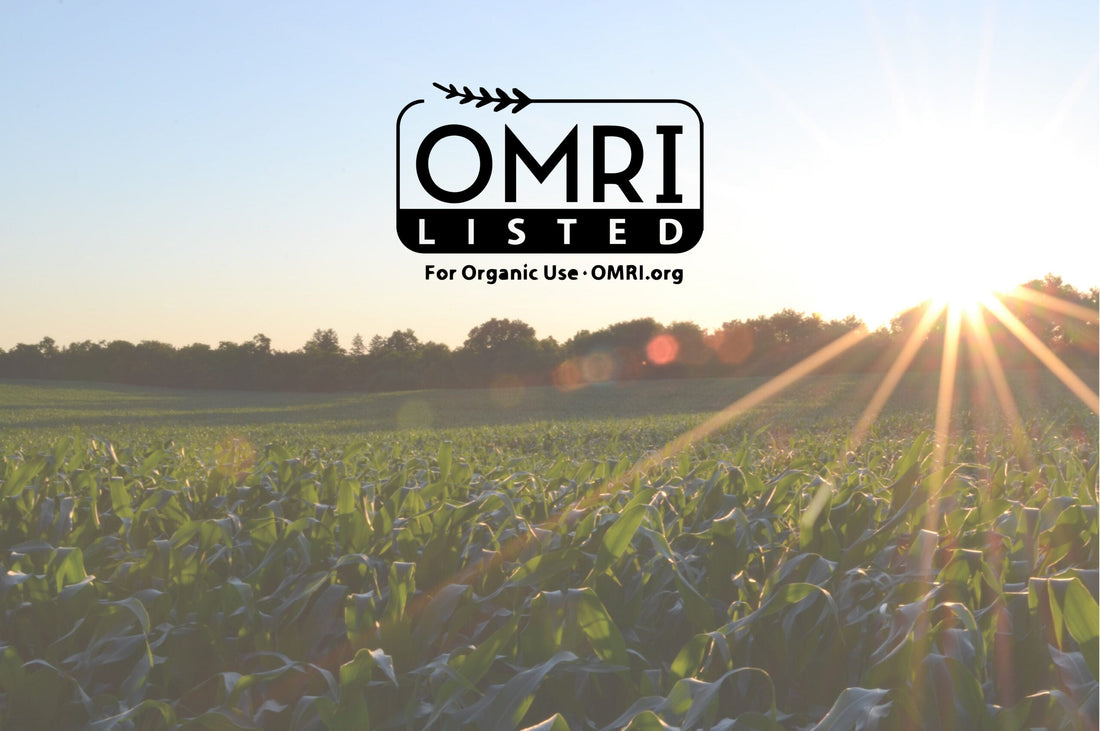
Why I Choose OMRI-Certified Substrate for My Mushroom Growing (And Why You Should Too)
10/31/24Share
Summary
OMRI certification plays a vital role in organic mushroom cultivation. This article explores what OMRI is, its importance for mushroom growers, and how Wildspore's OMRI-certified products contribute to sustainable and high-quality mushroom production.
Table of content
Understanding the Importance of Substrate in Mushroom Cultivation
Why OMRI Matters for Mushroom Growers
My journey with OMRI-certified materials has transformed my cultivation practices. The consistency in quality across batches has been remarkable. When you're working with certified substrate, you can focus on perfecting your technique rather than wondering if your growing medium is compromised. I've noticed significantly better colonization rates and higher yields, but perhaps most importantly, I've seen a dramatic reduction in contamination risks.
What is OMRI Certification?
Benefits of OMRI-Certified Substrate: The switch to OMRI-certified materials marked a turning point in my growing operation. The substrate's performance became predictable, with optimal moisture retention and pH levels that stayed consistent batch after batch.
Without synthetic chemicals in the mix, I observed improved mushroom quality and better shelf life. This natural approach aligns perfectly with the mushroom's own growing preferences, resulting in healthier fruits and more robust yields.
Cost vs. Value Analysis
Let's talk about the elephant in the room: cost. Yes, OMRI-certified materials like those from Wildspore often come with a higher price tag, but the value proposition is clear. I've documented fewer failed blocks, significantly higher yields per block, and consistently better quality mushrooms.
When you factor in the reduced losses from contamination and the premium price point for organic mushrooms, the investment quickly pays for itself. Moreover, the long-term sustainability benefits make it a sound choice for both commercial and hobby growers.
"OMRI certification isn't just a stamp of approval – it's your insurance policy for consistent yields. That's why I never compromise on certified materials."
My Personal Experience
Since making the switch to OMRI-certified substrate and grain spawn, the improvements in my cultivation success have been dramatic. Contamination rates in my grow room dropped by more than half, while yields increased by a quarter. Beyond the numbers,
I've noticed more consistent harvests and received better feedback from customers. The simplified organic certification process has saved me countless hours of documentation and troubleshooting.
Personal Note
Remember, while OMRI certification is important, it's just one part of successful mushroom cultivation. Proper technique, cleanliness, and attention to detail are still crucial. But starting with certified materials like those from Wildspore gives you the best foundation for success.
Tips for Choosing and Sourcing OMRI-Certified Substrate
When selecting OMRI-certified substrate for your mushroom growing needs, it's essential to do thorough research. Start by looking for suppliers who are transparent about their products and the OMRI certification process. Reputable suppliers will provide detailed information about the ingredients, sourcing methods, and benefits of their substrates.
Additionally, consider the specific requirements of the mushroom species you plan to grow. Different mushrooms thrive in unique substrates, so it’s crucial to find a product that aligns with the needs of your chosen fungi. For example, some mushrooms may prefer a wood-based substrate, while others may do better in straw or grain. By matching the substrate to your specific mushroom type, you increase the likelihood of a successful harvest.
Finally, don't hesitate to reach out to fellow growers or online communities for recommendations. Many experienced mushroom cultivators have valuable insights into reputable suppliers and the best OMRI-certified substrates for various mushroom species. Engaging with others in the community can help you make informed decisions and enhance your understanding of sustainable mushroom cultivation.
br/>
Case Studies Showcasing the Success of Using OMRI-Certified Substrate
Many mushroom growers have reported significant success after switching to OMRI-certified substrates. For instance, a local mushroom farm specializing in gourmet varieties made the transition to OMRI-certified materials and saw a dramatic increase in yield. The owner noted that the mushrooms not only grew faster but also exhibited enhanced flavors, leading to higher customer satisfaction and repeat business.
Another case involved a community-supported agriculture (CSA) program that integrated OMRI-certified substrates into their mushroom-growing practices. As a result, they observed a noticeable improvement in the health and appearance of their mushrooms, which became a popular item in their weekly boxes. The CSA's commitment to organic practices resonated with their customers, boosting their sales and community reputation.
These success stories highlight the tangible benefits of using OMRI-certified substrates. By investing in high-quality organic materials, growers can enhance their yields, improve the quality of their products, and ultimately contribute to a more sustainable agricultural landscape.
br/>
Comparing OMRI-Certified Substrate with Other Alternatives
When evaluating substrate options, it's important to compare OMRI-certified substrates with other alternatives. Many conventional substrates may offer lower upfront costs, but they often come with hidden risks associated with synthetic chemicals and lower quality. These substrates may not support optimal mushroom growth, leading to lower yields and potentially compromising the quality of the final product.
In contrast, OMRI-certified substrates may have a higher initial investment but pay off significantly in the long run. The superior quality and sustainability of these substrates lead to healthier mushrooms, higher yields, and better marketability. Additionally, the peace of mind that comes from knowing you are using safe, organic materials is invaluable.
Moreover, the market for organic products continues to grow. Consumers are increasingly seeking out organic mushrooms for their health benefits and superior taste. By choosing OMRI-certified substrate, you position yourself to meet this growing demand and build a loyal customer base that values quality and sustainability.
br/>
Conclusion: Why You Should Choose OMRI-Certified Substrate for Your Mushroom Growing Journey
In conclusion, the choice of substrate plays a crucial role in the success of mushroom cultivation. By selecting OMRI-certified substrate, you are investing in the health, quality, and sustainability of your mushroom crops. The benefits of using this premium substrate are numerous, from promoting healthy growth to minimizing environmental impact.
As a passionate mushroom grower, you owe it to yourself and your customers to provide the best possible growing conditions. OMRI-certified substrates not only meet the highest organic standards but also enhance the flavor and quality of your harvest. By making this informed choice, you can cultivate mushrooms that stand out in a competitive market while supporting sustainable agricultural practices.
As you embark on your mushroom growing journey, consider the long-term advantages of using OMRI-certified substrate. Together, we can unlock the full potential of our fungi and contribute to a healthier planet for future generations. Choose wisely and grow with the confidence that comes from using the best materials available.
br/>
This page has been viewed 0 times.
FAQ
Sources and Further Reading
1. OMRI Official Website (omri.org)
2. USDA National Organic Program Standards
3. Journal of Organic Agriculture (2023) - "Impact of Certified Organic Substrates on Mushroom Yields"
4. American Mushroom Institute Guidelines
5. Cornell University Mushroom Growing Guide
6. Studies from Paul Stamets on Organic Mushroom Cultivation
Keywords: OMRI certification, organic mushroom growing, mushroom substrate, grain spawn, organic certification, mushroom cultivation, organic farming, food safety, mushroom yields, contamination prevention





